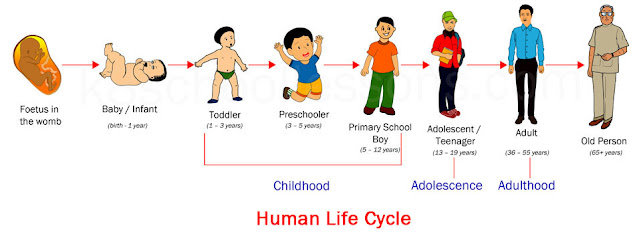The human life cycle is a fascinating journey that encompasses the stages and processes of our existence, from conception to old age. It is a remarkable continuum of growth and development that shapes who we are as individuals. In this article, we embark on a delightful journey through the stages in the human life cycle; foetus, baby, child, adolescent, adult and old person.
 |
| Human Life Cycle | Stages of Human Life Cycle | Science for Kids |
Understanding the Human Life Cycle:
The human life cycle encompasses the incredible journey from the moment of conception to the later stages of old age. Let's embark on this educational adventure as we explore each stage of life and the remarkable transformations that occur.
1. The Beginning of Life:
We start our journey at the beginning, exploring the wonders of conception and the magical process of prenatal development. Discover how a tiny fertilized embryo grows and develops within the mother's womb.
2. The Early Years:
Next, we venture into the early years of life, filled with excitement and exploration. From infancy to early childhood, children experience incredible growth and development, mastering fundamental skills and reaching significant milestones.
3. Growing Up:
As we progress, we dive into the world of childhood and adolescence. Learn about the physical, emotional, and cognitive changes that shape this stage of life. From friendships and hobbies to the onset of puberty, discover the unique experiences of growing up.
4. Embracing Adulthood:
Our journey continues into adulthood, where individuals navigate the challenges and joys of independence. Explore the world of careers, relationships, and personal growth as we delve into the complexities of adulthood.
5. The Wisdom of Age:
In the later stages of life, we uncover the beauty of old age. Reflect on the wisdom and experiences that come with age, while acknowledging the physical and cognitive changes that may occur during this period.
Fostering Understanding and Connection:
Understanding the human life cycle holds great importance for young learners. By gaining knowledge about each stage, we can provide appropriate support and guidance, nurture empathy and respect, and strengthen the bond between generations. Let's foster a deeper understanding of our own lives and the lives of those around us.
Conclusion:
By exploring the stages of life in an engaging and accessible manner, we foster a deeper understanding of our remarkable existence. Visit k8schoollessons.com to explore the informative article about the human life cycle, where you'll find valuable insights and resources to enhance your understanding of this captivating topic.
Comments
Post a Comment